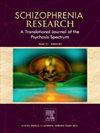Acceptance and Commitment Therapy-based Lifestyle Counselling Program for people with early psychosis on physical activity: A pilot randomized controlled trial
IF 3.6
2区 医学
Q1 PSYCHIATRY
引用次数: 0
Abstract
Objective
To evaluate the feasibility, acceptability and efficacy of an Acceptance and Commitment Therapy-based Lifestyle Counselling Program (ACT-LCP) on health outcomes of individuals with early psychosis.
Methods
In this assessor-blinded, parallel-group pilot randomized controlled trial, 72 early psychosis patients (mean age [SD] = 30.51 [8.02], 58.3 % female) were randomized to either the ACT-LCP group or a control group. The ACT-LCP group underwent a five-week group program focusing on ACT-based motivation for healthy lifestyles, a booster session, and two follow-up calls. The control group received standard care, one lifestyle education session, and three follow-up calls. Outcomes including physical activity, autonomous motivation, psychological flexibility, mental status, and quality of life were measured at baseline, 1-week, and 12-week post-intervention. Recruitment, retention, and adherence rates were evaluated. Focus group interviews explored participants' experiences.
Results
Generalized estimating equation models demonstrated that when compared to the Control group, the ACT-LCP group showed a sixfold likelihood of engaging in at least 150 min of moderate to vigorous physical activity per week (adjusted prevalence ratio = 6.28, 95 % CI [2.09–18.93], P ≤ 0.001) at 12-week post-intervention. Improvements at 12-week also included autonomous motivation (adjusted mean difference, aMD = 4.74; P < .001), psychological inflexibility (aMD = −7.69; P < .001), mental status (aMD = −6.83; P < .001), and quality of life (aMD = 0.46; P = .006). Recruitment was successful at 55.8 %, retention at 89 %, and adherence at 80.6 %. Engagement challenges were noted in focus groups.
Conclusions
The ACT-LCP is feasible and acceptable, demonstrating initial efficacy in individuals with early psychosis. Further research should refine the intervention and explore long-term impacts.
ClinicalTrial.gov Identifier: NCT04916496.
接受与承诺治疗为基础的生活方式辅导计划对早期精神病患者的身体活动:一项随机对照试验。
目的:评价基于接受与承诺治疗的生活方式咨询项目(ACT-LCP)对早期精神病患者健康结局的可行性、可接受性和有效性。方法:在本评估盲、平行组先导随机对照试验中,72例早期精神病患者(平均年龄[SD] = 30.51[8.02], 58.3%为女性)随机分为ACT-LCP组和对照组。ACT-LCP组进行了为期五周的小组计划,重点是基于act的健康生活方式的动机,一次促进会议和两次随访电话。对照组接受标准治疗、一次生活方式教育和3次随访电话。结果包括体力活动、自主动机、心理灵活性、精神状态和生活质量在干预后基线、1周和12周进行测量。评估招募率、留任率和依从率。焦点小组访谈探讨了参与者的经历。结果:广义估计方程模型显示,与对照组相比,ACT-LCP组在干预后12周每周至少进行150分钟中等至剧烈体育活动的可能性为对照组的6倍(校正患病率= 6.28,95% CI [2.09-18.93], P≤0.001)。12周时的改善还包括自主动机(调整后平均差,aMD = 4.74;结论:ACT-LCP是可行和可接受的,对早期精神病患者有初步疗效。进一步的研究应完善干预措施并探索长期影响。临床试验:gov标识符:NCT04916496。
本文章由计算机程序翻译,如有差异,请以英文原文为准。
求助全文
约1分钟内获得全文
求助全文
来源期刊

Schizophrenia Research
医学-精神病学
CiteScore
7.50
自引率
8.90%
发文量
429
审稿时长
10.2 weeks
期刊介绍:
As official journal of the Schizophrenia International Research Society (SIRS) Schizophrenia Research is THE journal of choice for international researchers and clinicians to share their work with the global schizophrenia research community. More than 6000 institutes have online or print (or both) access to this journal - the largest specialist journal in the field, with the largest readership!
Schizophrenia Research''s time to first decision is as fast as 6 weeks and its publishing speed is as fast as 4 weeks until online publication (corrected proof/Article in Press) after acceptance and 14 weeks from acceptance until publication in a printed issue.
The journal publishes novel papers that really contribute to understanding the biology and treatment of schizophrenic disorders; Schizophrenia Research brings together biological, clinical and psychological research in order to stimulate the synthesis of findings from all disciplines involved in improving patient outcomes in schizophrenia.
 求助内容:
求助内容: 应助结果提醒方式:
应助结果提醒方式:


